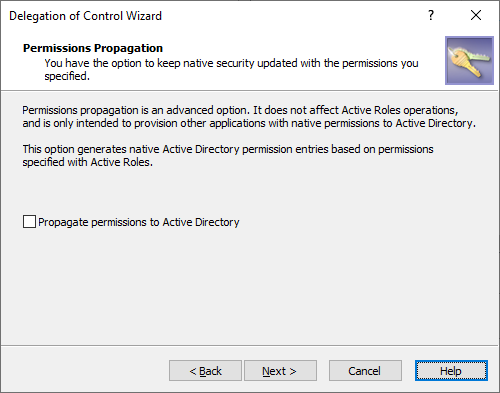To delegate forest configuration duties to operators within your organization, use the Access Templates (ATs) available under the Configuration > Access Templates > Active Directory > Best Practices for Delegating Active Directory Administration > Forest Configuration Operators Role container of the Active Roles Console.
Forest configuration operators typically perform the following duties in an Active Directory (AD) organization:
-
Add or remove top-level names and top-level name exclusions from a realm trust.
-
Enable or disable placing name suffix (that is, top-level name) information on a realm trust.
-
Modify the transitivity of a realm trust.
-
Change trust direction.
-
Create or delete trusts for all domains.
-
Force the removal of a trust.
-
Reset the trust passwords shared by a trust-pair.
-
Create child domains in an existing domain tree.
-
Demote the last Domain Controller (DC) in a child domain or forest-root domain.
-
Transfer or seize the domain naming master role.
-
Enable or disable name suffix routing for a specific suffix in a forest.
-
Enable or the disable the Security Identifier (SID) history in outbound forest trusts.
-
Enable or disable SID filtering.
-
Enable selective authentication on an outbound forest or external trust.
-
Raise the forest functional level.
-
Manage all LDAP query policy-related administrative tasks.
|
Access Template |
Description |
| Forest Configuration Operators - Change Domain Master Management |
Grants the following permissions, applied to all classes:
To delegate this AT, select the trustee(s), then apply it to the domain partitions container of your AD environment: <forest-root-domain> > Configuration > Partitions |
| Forest Configuration Operators - Change Schema Master Management |
Grants permission to modify the schema master. To delegate this AT, select the trustee(s), then apply it to the domain schema container of your AD environment: <forest-root-domain> > Configuration > Schema IMPORTANT: When configuring this AT, always select the Propagate permissions to Active Directory option in the Permissions Propagation step of the Delegation of Control Wizard. Figure 3: Delegation of Control Wizard – Permissions propagation
For more information on how to configure ATs for resource objects in your organization with the Active Roles Console, see Applying Access Templates in the Active Roles Administration Guide. |
| Forest Configuration Operators - Computer Object Creation |
Grants permission to create computer objects in the forest, applied to all classes. To delegate this AT, select the trustee(s), then apply it to the Domain Controllers container of your AD environment: <domain> > Domain Controllers This will apply the AT to every domain in your forest. |
| Forest Configuration Operators - Full Control for "Creator Owner" |
Grants full permission to the Creator Owner role in your forest environment, applied to all classes. To delegate this AT, select the trustee(s) you want to assign as Creator Owner(s), then apply the AT to the site configuration container: <forest-root-domain> > Configuration > Sites |
| Forest Configuration Operators - Full Control on Computer Object |
Grants full permission to perform domain configuration tasks on all computer objects. To delegate this AT, select the trustee(s), then apply the AT on the computer object that will be promoted to Domain Controller (DC). |
| Forest Configuration Operators - NTDS Domain Controller Settings Management |
Grants permission to write the queryPolicyObject attribute, applied to the NT Directory Services (NTDS) of the DC settings. To delegate this AT, select the trustee(s), then apply it to the DC NTDS settings container of your AD environment: <forest-root-domain> > Configuration > Sites > <site> > Servers > <domain-controller> > NTDS Settings |
| Forest Configuration Operators - NTDS Site Settings Management |
Grants permission to write the queryPolicyObject attribute, applied to the NTDS site settings. To delegate this AT, select the trustee(s), then apply it to the site NTDS settings container of your AD environment: <forest-root-domain> > Configuration > Sites > <site> > NTDS Site Settings |
| Forest Configuration Operators - Query Policies Management |
Grants the following permissions:
To delegate this AT, select the trustee(s), then apply it to the site NTDS query policies container of your AD environment: <forest-root-domain> > Configuration > Services > Windows NT > Directory Service > Query-Policies |
| Forest Configuration Operators - Replication Management |
Grants the following forest-level configuration permissions:
To delegate this AT, select the trustee(s), then apply the AT to the following AD container: <forest-root-domain> > Configuration NOTE: You must apply the permissions that are specified by this AT to the AD configuration schemas too. These are located in the following container: <forest-root-domain> > Configuration > Schema To apply the permissions to the Schema container, use native AD management tools, such as ADSI Edit. |
| Forest Configuration Operators - Server Object Creation |
Grants permission to create all server child objects in the forest, applied to all classes. To delegate this AT, select the trustee(s), then apply the AT to the AD server configuration container: <forest-root-domain> > Configuration > Sites > <site> > Servers |
| Forest Configuration Operators - Site Objects - Read All Properties |
Grants permission to read all site objects in the forest, applied to all classes. To delegate this AT, select the trustee(s), then apply the AT to the AD site configuration container: <forest-root-domain> > Configuration > Sites |
| Forest Configuration Operators - Trust Relationship Management |
Grants the following permissions:
To delegate this AT, select the trustee(s), then apply it to the domain system container of every domain in your forest: <domain> > System |

